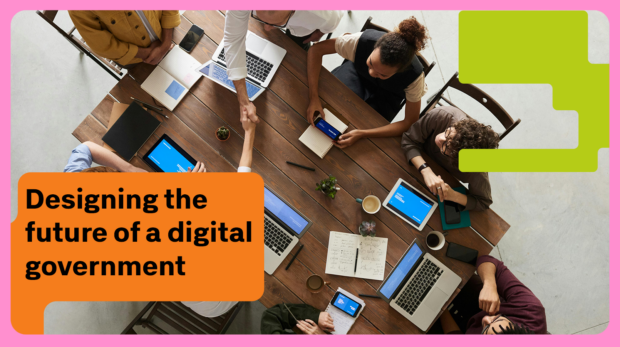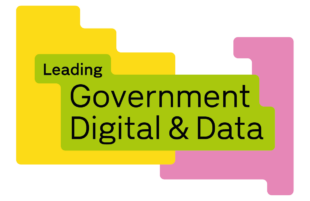
Hi, I’m Emily Middleton. I’m leading work on the Digital Centre Design, an exciting and ambitious project to design the scope, strategy and structure of the new digital centre of government.
Back in July it was announced that the Department for Science, Innovation and Technology (DSIT) would expand to include the Government Digital Service (GDS), the Central Digital and Data Office (CDDO) and the Incubator for AI (i.AI), uniting efforts in the digital transformation of public services under one department.
This provided the perfect opportunity to deliver a new and refreshed digital vision for public services - one that creates a more personalised, convenient and time saving experience for the public, alongside boosting economic growth through using data, technology, and procurement reform to accelerate innovation, investment and productivity.
With the challenge set work began in earnest to bring together a dedicated team from across all four organisations to gather information, understand and challenge the current state of digital government - what was working, what needed to change or could be better and what new ideas could help shape the vision for the future. In this post, I’m going to set out how we’re listening: to digital and data practitioners and leaders across government and the wider public sector, to tech companies, to civil society groups, think tanks, and beyond.
Shaping and sharing the Vision
With so much information to take in and a tight time frame it’s been vital that we avoid falling into a siloed approach. We started by meeting with staff in GDS, CDDO and i.AI to capture their experiences and ideas. We’ve been looking at ‘what we should start doing’, ‘what we should stop doing’ and ‘where we need to reinvigorate or accelerate’. Views were shared at 11 workshops, with over 300 people attending. As you’d expect these sessions generated a huge amount of discussion and feedback. Priorities for staff that we took away included for the digital centre to:
- Improve services by transforming end to end service delivery from the perspective of people who use our services, not just the front-end digital service
- Lead and maintain a step change towards an innovative, resilient and interoperable digital government designed for everyone, regardless of their access needs, digital confidence or personal circumstances
- Unlock the value of data to deliver better services to citizens, economic growth and public sector productivity.
- Develop a sustainable supply of expert digital talent, and workforce that will deliver on economic growth, public sector productivity, and delivery of trusted services that meet user needs.
- Foster innovation across government [and the broader public sector], by removing blockers and challenges within the system, enabling departments to innovate freely
- Take a leading role to build and maintain enhanced and innovative digital commercial strategies, solutions and capability
We’ve also been heading out to gather views and suggestions from across government. So far this has included workshops with people from different directorates in DSIT, where we’ve held 8 workshops, as well as collecting written feedback from people who couldn’t make the events. Alongside this we’ve gathered thoughts from groups such as the Four Nations Digital Collaboration Group, the Digital and Data Functional Leadership Group and the Chief Technology Officer Council. It’s been really helpful to understand what support they most value from the centre, and what needs to change. We’ve also had some good conversations around the trade offs, for instance between a wide mandate to collaborate beyond central government to help drive systemic change, with being able to be more focused and move faster with fewer partner organisations.
External inspiration
To help us in our work we’re also being supported by a panel of technology experts, advocates, and academics. The group is co-chaired by Baroness Martha Lane Fox and Chair of the Central Digital and Data Office Paul Willmott and brings a wealth of talent and UK and international experience.
“The UK has an opportunity to deliver modern, reliable public services that benefit citizens while also helping to grow the economy. I am excited to help.”
Baroness Martha Lane Fox
The panel will be bringing their expertise to help us challenge our thinking and sharing their ideas on how to deliver a vision that improves lives, supports mission delivery, and contributes to economic growth.
Topics considered at their first meeting included data exchange, artificial intelligence, trust, accountability, inclusion, the role of intermediaries (like civil society groups) in providing public services, and getting the balance right between centralised and decentralised approaches.
We’re also organising a number of roundtables supported by organisations such as the think tank Reform, The British Academy, Tech UK, Connected by Data and more. We want to speak to people with a range of experience working in and with government on technology and digital public services.
What’s next
Over the next month or so we will be focused on building on our early engagement to reach out to:
- Digital, data and tech practitioners from across and beyond central government, especially in local government
- Civil servants who work on end-to-end service transformation, not just those with a "digital" or "data" label
- More practitioners, think tanks, and networks outside of government, to help us expand our thinking
We’ll be keeping you up to date as this work progresses, but we’d love to hear from you. Please share your thoughts and ideas for the future of digital public services and the new digital centre of government in the comments below.

3 comments
Comment by David Durant posted on
Really great to see this blog post from Emily and to hear about the breadth of conversation that's already taken place. Once the decisions (and hopefully principles!) regarding the new direction for the Digital Centre are announced it would be fascinating to here from some of the people that took part whether they reflect what they wanted to see. I'm also very much looking forward to hearing how the impact of the new strategy will be tracked and whether there will be a reintroduction of a Digital Board made up of external-to-government members like there was in the early days of GDS.
We have a huge opportunity to have another jump in the evolution of digital government at least equivalent to what GDS did in its first two years but I worry about the amount of political capital needed to overcome overwhelming focus on risk and a huge amount of sunk cost fallacy.
I hope we'll see a lot more of posts like this - and video too please. It's inspire me to get back to trying to turn my thoughts on the subject into something coherent. Thanks!
Comment by Adrian Field posted on
Hi Emily,
At OneID we are working with UK banks on using DIATF-certified digital ID services to improve efficiency, help economic growth and prevent fraud and online harms. We would love to share views on how public & private sectors can work together on these things, e.g. starting a company needs services from both government (e.g. ID from One Login to CH) and private sector (e.g. ID to open bank accounts), so interoperability and secure data sharing across sectors are important.
Regards,
Adrian
Comment by Craig Cheney posted on
Hi Emily,
This is really exciting. At Cambridge Management Consulting we have teamed up with Futuria to support the use of Agentic AI across repeatable processes. There is so much opportunity to improve the speed and efficiency of processes and free up people to do the more difficult work across teams, services and systems.
Looking forward to what comes next!
Craig